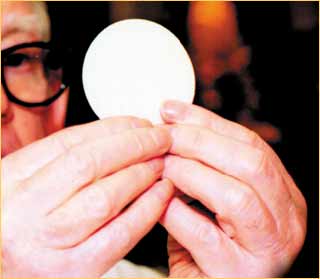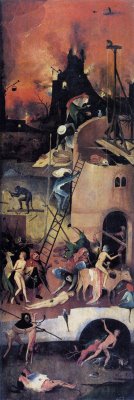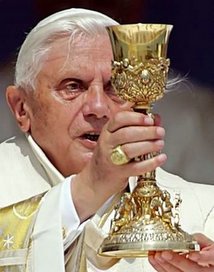 Who can be admitted to Holy Communion is one of the issues that the US bishops are asking this autumn, Nancy Frazier O'Brien summarises a paper up for discussion. I understand that it is something our own Bishops are being urged to discuss again.
Who can be admitted to Holy Communion is one of the issues that the US bishops are asking this autumn, Nancy Frazier O'Brien summarises a paper up for discussion. I understand that it is something our own Bishops are being urged to discuss again.A Catholic who "knowingly and obstinately" rejects "the defined doctrines of the church" or its "definitive teaching on moral issues" should refrain from receiving Communion, according to a document that will come before the U.S. bishops at their Nov. 13-16 fall general meeting in Baltimore.
The document, "'Happy Are Those Who Are Called to His Supper': On Preparing to Receive Christ Worthily in the Eucharist," requires the approval of two-thirds of the members of the U.S. Conference of Catholic Bishops for passage.
In an introduction, Bishop Arthur J. Serratelli of Paterson, N.J., chairman of the USCCB Committee on Doctrine, said the draft document was the result of a proposal to the bishops in November 2004 by Archbishop John J. Myers of Newark, N.J., for a statement on how Catholics should prepare to receive the Eucharist.
"He envisaged this document as applying to Catholic faithful, not just to politicians or those in public life," Bishop Serratelli said. Archbishop Myers' request came after a presidential campaign in which some bishops had criticized the Democratic candidate, Sen. John Kerry of Massachusetts, and said he and other Catholic politicians who supported abortion should be refused Communion under canon law.
But a footnote to the draft says that it is not intended "to provide specific guidelines" to the provision in canon law that says that Catholics "obstinately persevering in manifest grave sin" should not be allowed to receive Communion."
In order to receive holy Communion we must be in communion with God and with the church," the document says. "If we are no longer in a state of grace because of mortal sin, we are seriously obliged to refrain from receiving holy Communion. "Among examples of such sin, the document cites "committing deliberate hatred of others, sexual abuse of a minor or vulnerable adult, or physical or verbal abuse toward one's family members or fellow workers, causing grave physical or psychological harm; murder, abortion or euthanasia.
"Other "serious violations of the law of love of God and of neighbor" listed in the draft include swearing a false oath, missing Mass on Sundays or holy days without a serious reason, "acting in serious disobedience against proper authority," sexual activity "outside the bonds of a valid marriage," stealing, slander or involvement with pornography.The document criticized those who "give selective assent to the teachings of the church. "But Catholics who have "honest doubt and confusion" about some church teachings "are welcome to partake of holy Communion, as long as they are prayerfully and honestly striving to understand the truth of what the church professes and are taking appropriate steps to resolve their confusion and doubt," the draft says."If someone who is Catholic were knowingly and obstinately to reject the defined doctrines of the church, or knowingly and obstinately to repudiate her definitive teaching on moral issues, however, he or she would seriously diminish his or her communion with the church," it adds. "Reception of holy Communion in such a situation would not accord with the nature of the eucharistic celebration, so he or she should refrain."If a person who "is publicly known to have committed serious sin or to have rejected definitive church teaching and is not yet reconciled with the church" receives Communion, it could be "a cause of scandal for others," giving "further reason" for the person to refrain, the bishops said.
The document says Catholics should get ready to receive Communion through both "remote preparation" -- prayer, Scripture reading, frequent confession and other steps -- and "proximate preparation."The bishops said elements of proximate preparation include maintaining "reverent silence" before Mass begins; refraining from food and drink for an hour before receiving Communion; dressing "in a modest and tasteful manner" at Mass; listening attentively to the Scripture readings and homily; and actively participating in the Mass "with our whole hearts and minds and bodies."The bishops also urged Catholics to make "a reverent bow of the head" before receiving Communion.
"If we perform these simple actions, we will enter more profoundly into the eucharistic celebration, receive the Eucharist more worthily, and thus obtain more fully the grace of communion with the risen Lord Jesus and with one another," the document says.
The draft also includes two appendices explaining church teaching on when non-Catholics can receive Communion in a Catholic church and when Catholics are permitted to take Communion at a non-Catholic service.
"When participating as guests in worship services in other Christian communities, Catholics are encouraged to join the community in the shared responses and in the singing of hymns," the document says. "It would be inappropriate, however, for Catholics to take communion in other Christian communities."The document also reminds Catholics who join in non-Catholic services on a Sunday that "the obligation to participate at a Catholic Mass still remains."ration, receive the Eucharist more worthily, and thus obtain more fully the grace of communion with the risen Lord Jesus and with one another," the document says.









 a post I made below "By their fruits ...", “I get annoyed with Catholics and others who come out with the rather meaningless platitude, "Well, we all worship the same God". My answer: Don't be daft of course we don't!”"
a post I made below "By their fruits ...", “I get annoyed with Catholics and others who come out with the rather meaningless platitude, "Well, we all worship the same God". My answer: Don't be daft of course we don't!”"



 Q: Some say that since the sexual revolution of the 1960s, the Church has been challenged in a way it has never been before to defend its teachings on sexuality. In what way? Father Percy: Most cultural commentators would agree that the sexual revolution began in the 1920s. In fact, G.K. Chesterton said of the sexual revolution that there was "more madness coming out of Manhattan than there was out of Moscow!" He perceived that the next heresy the Church would have to deal with would be of a sexual nature. We, now living in the 21st century, surely have no problems in recognizing the immense challenge before us. But "today" is our starting point and not "yesterday" or "tomorrow" -- what might have been or what might be. And the starting point -- or so it seems to me -- is this wonderfully intriguing and inviting teaching called the theology of the body.
Q: Some say that since the sexual revolution of the 1960s, the Church has been challenged in a way it has never been before to defend its teachings on sexuality. In what way? Father Percy: Most cultural commentators would agree that the sexual revolution began in the 1920s. In fact, G.K. Chesterton said of the sexual revolution that there was "more madness coming out of Manhattan than there was out of Moscow!" He perceived that the next heresy the Church would have to deal with would be of a sexual nature. We, now living in the 21st century, surely have no problems in recognizing the immense challenge before us. But "today" is our starting point and not "yesterday" or "tomorrow" -- what might have been or what might be. And the starting point -- or so it seems to me -- is this wonderfully intriguing and inviting teaching called the theology of the body. 


